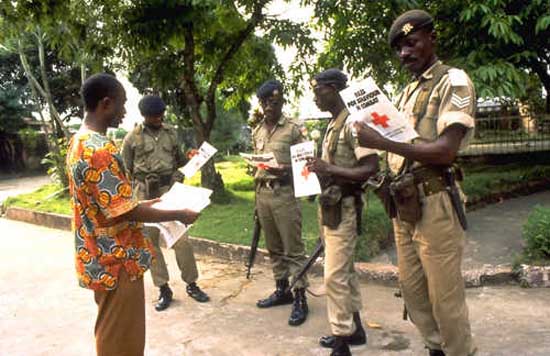
Liberia RPCV Kathryn Scott defends area against disease, terror as epidemiologist
Scientist defends area against disease, terror
Clackamas County's first epidemiologist also has been coordinating a regional response to an attack
02/06/04
DAVID STERRETT
Kathryn Scott became interested in public health while trying to control the spread of tuberculosis in Liberia, working for the Peace Corps in the early 1980s.
Scott will always think about the people in the West African country. However, she's focusing her experience and expertise on Clackamas County to help prevent outbreaks of disease.
In September, the county used federal bioterrorism money to hire Scott as the county's first epidemiologist.
Scott monitors infectious diseases such as food-borne illnesses or sexually transmitted diseases, and helps plan how the county would respond to a bioterrorist attack such as an outbreak of smallpox or anthrax.
"Every day my job is different, and sometimes I wear many hats," said Scott, who previously worked as the epidemiologist for Sonoma County in northern California. "The bioterrorism money isn't only to prepare for a big event, but also to make our day-to-day functions more efficient."
Last year, Clackamas County received more than $300,000 in the second year of bioterrorist funding. The federal Centers for Disease Control and Prevention gives money to state governments, and Oregon distributes it to the counties depending on their needs, said Dr. Alan Melnick, Clackamas County health officer.
The county used the money to hire a bioterrorist coordinator in January 2003, a second nurse to deal with transmittable diseases in June 2003 and Scott. Congress appropriates the money on a yearly basis, and Melnick doesn't expect the funding to end soon because there continues to be a threat of a bioterrorist attack.
"We've done a lot of planning for a bioterrorist event that the public would never notice," Melnick said. "The county was not unsafe before, but hiring an epidemiologist was a critical need."
Dr. Mel Kohn, the state epidemiologist, estimated about only five of the 34 health departments in Oregon have hired epidemiologist with bioterrorist money.
The state has about 25 epidemiologists, and the counties with an epidemiologist are usually the larger counties where they're needed most, Kohn said.
Scott works with epidemiologists from Multnomah and Washington counties, who also were hired with bioterrorist money in the past two years, to prepare a regional response to a possible outbreak.
Investigation procedures are being standardized, and public health departments are being trained how to manage a response to an outbreak.
Scott also is developing a 24-hour response system and rapid fax capability that would allow the county to quickly contact all area physicians in case of an outbreak.
"It's really going to help us if there is an outbreak, but it also helps with our daily work," said Marti Franc, the county's public health services manager.
Scott is helping the county put its records into an electronic database to create a health profile that would allow the public to understand the impact of various diseases in the county.
Scott has a doctorate in community health science from the University of California in Los Angeles and a master's in population and family health from UCLA. She also has a bachelor's degree in microbiology from Purdue University in Indiana.
But the epidemiologist said nothing she has dealt with in the county compares to what she witnessed in Liberia.
"The experience in Liberia really shifted my worldview, and it's hard to realize how difficult life is in developing countries," said Scott, who lives with her husband and two daughters in Tualatin. "Liberia gave me appreciation for what we can achieve in this country with the infrastructure we have here."
David Sterrett: 503-294-5920; davidsterrett@news.oregonian.com
